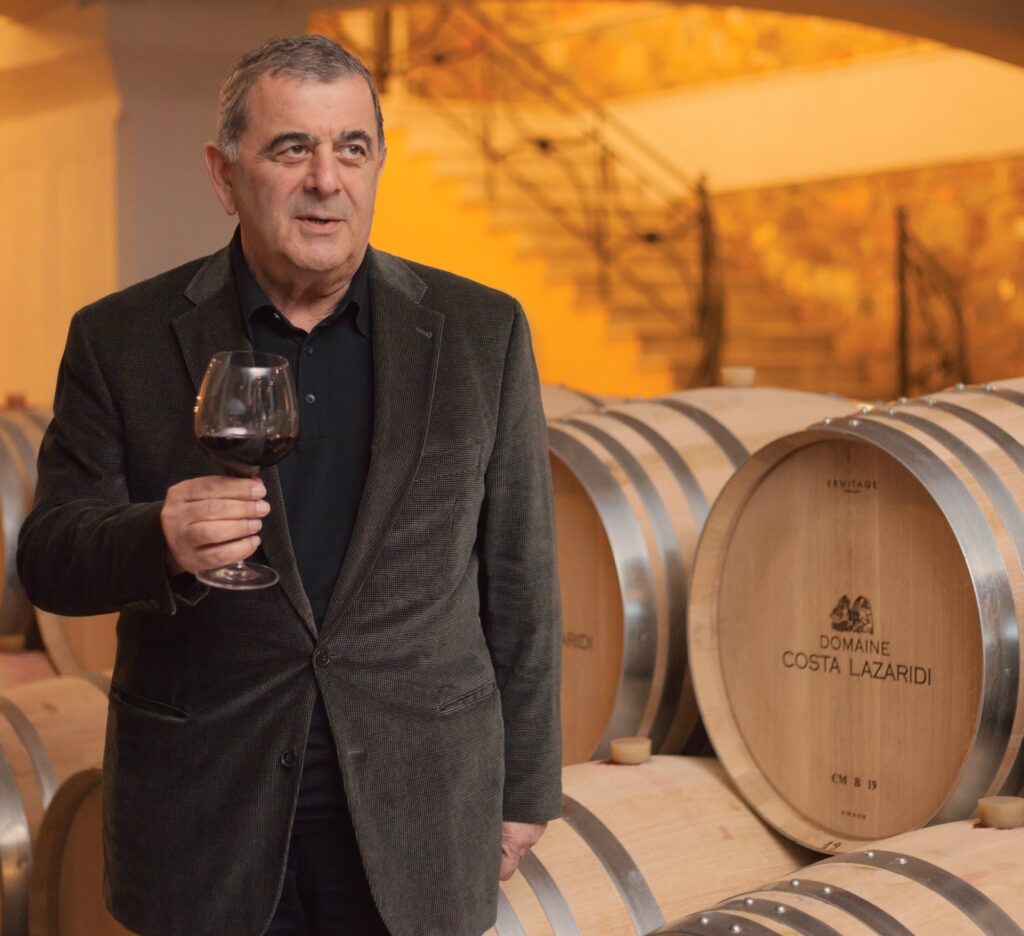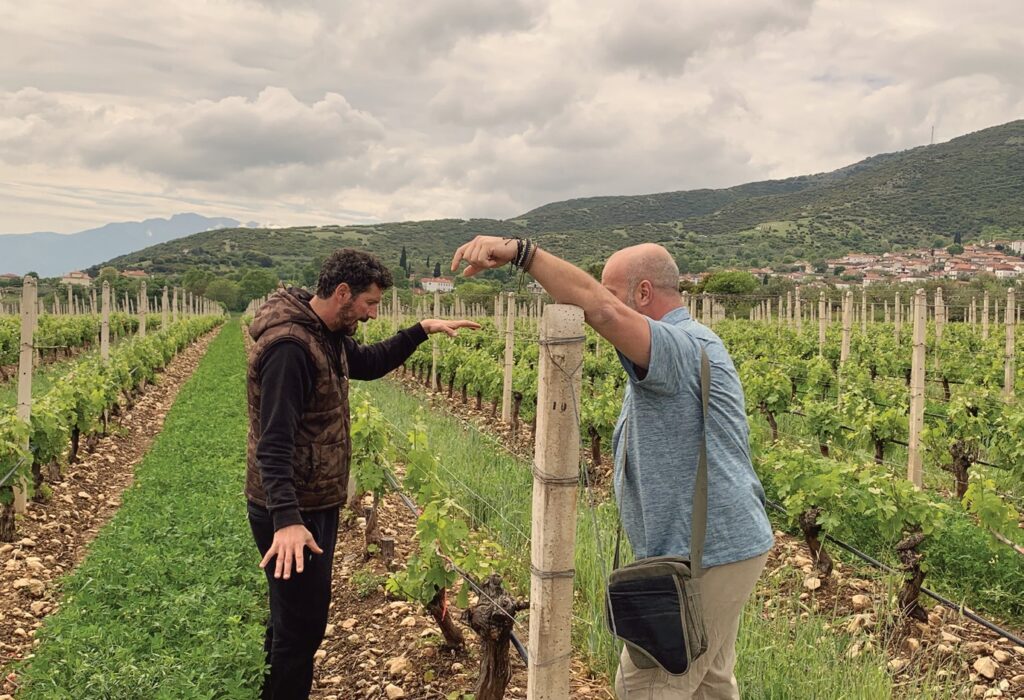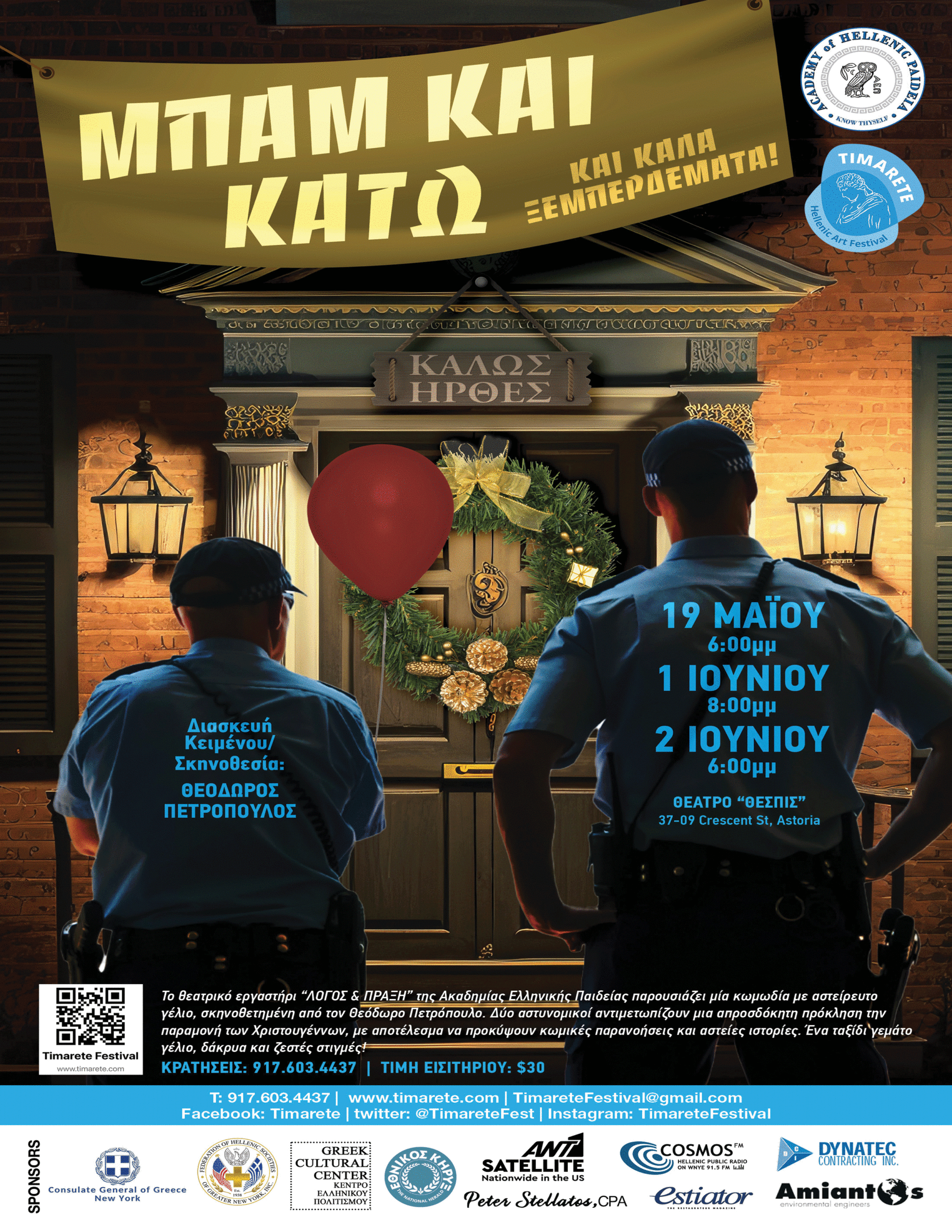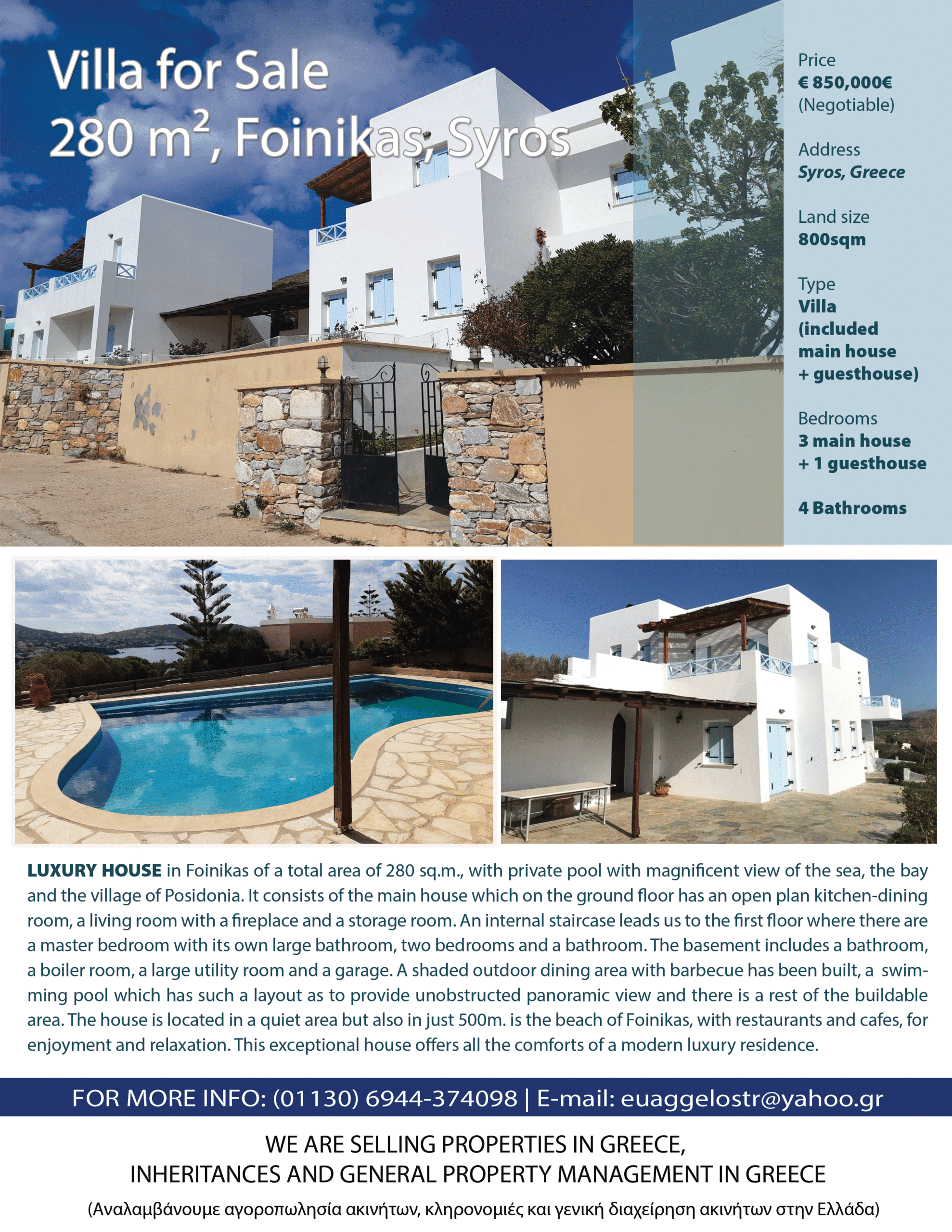Back to the FUTURE
Posted by estiator at 12 July, at 11 : 22 AM Print

Cover Story
Costas Lazaridis revives Drama’s ancient glory days of winemaking.
By Constantine N. Kolitsas
One might say that Greek winemaker Costas Lazaridis has lost his marbles. Well, sold them off, to be precise. The scion of one of Greece’s greatest marble producers, his name today is synonymous with some of the best wines of the Greek wine renaissance; a renaissance that has been vigorously underway for the last two decades, with global palates continuing to accept and grow demand for quality wines from Greece. And if several of Lazaridis’s wines have been in production for nearly four decades, a visitor to his winery in the northeastern Greek province of Drama gets the distinct impression that he’s just getting started.
Wines bottled under the Amethystos, Château Julia, Oenotria Land, and Oenodea labels, as well those under his Domaine Costa Lazaridi label, are wines of superb craftsmanship. Except for Oenotria Land (with vineyards located on a mountainous region outside of the Greek capital), the wines of Costas Lazaridis are produced from grapes grown in his native Drama. If commercial wine production in Drama is relatively new, it is at once ancient. In the nearby hills sit the fifth century BC ruins of an ancient temple to Dionysus, the Greek god of wine. According to myth, it was here that Dionysus first introduced wine to mankind, and bestowed upon the citizens of Drama the secrets of viticulture, which later spread to other parts of Greece and the ancient world. A wine festival has been held here annually since the temple’s inception, paused only during the Ottoman occupation, and the point at which “commercial” production was halted. Petrified grape seeds are among the finds here that support the oral history of the area’s wine-making glory days. For Lazaridis, winemaking came as a second career. As a young man in the 1970s, Costas left Greece to study at university in Germany, where he remained, forging his career managing the European operations for the family’s marble company, which remained in business until recently (it was sold just a few years ago). In his time abroad, he developed a deep love for wine. In 1979 he returned briefly to Drama, where he planted the region’s first modern linear vineyard on the slopes of mount Falakro, around his house, with the conviction that he could produce wines on par with those he enjoyed in Europe. By the mid-80s, he had begun to produce wines that were quite good, and in 1986 he built the region’s first modern winery: the Constantinos Lazaridis Winery-Bottling Company, returning to Drama permanently. A year later, he and his older brother Nico founded Lazaridis WIAC SA, which he ran until the end of 1991, when differing visions separated the brothers and the business. (Nico would go on to create his own competing label.)

And so it was that, in 1992, Domaine Costa Lazaridi was born. Beginning with that initial 10-hectare vineyard, Domaine Costa Lazaridi today cultivates the noblest international and Greek grape varieties over a span of approximately 300 hectares that are situated in four distinct areas of Drama (Adriani, Kali Vryssi, Katafyto, and Platania), as well as in Kapandriti, in the Attic region outside of Athens. More than 700 awards and distinctions (including several gold medals) from some of the largest and most prestigious competitions in the world are testament to the high-quality wines produced by him and his team.
“When Costa started, he was the first to plant vineyards professionally in Drama,” says Giorgos Zacharis, who has been with Lazaridis since his days running the marble business, and serving today as the company’s chief executive officer. Today, he adds, the region is considered the Bordeaux of the Balkans, producing wines of exceptional quality. As always, success attracts others, and today there are about 10 wine producers in Drama and its surrounding environs, most of which also produce fine wines. With Lazaridis leading the effort, wines of Drama have been given their own PGI designation, an EU standard that identifies a specific geographic region for its quality. Currently, he is petitioning for Drama to be granted PDO (Protected Designation of Origin) status, the highest-quality classification for European wines and agricultural products.
“The first plantings in 1979 were of Sauvignon Blanc and Assyrtiko grapes,” says Zacharis, a sixtyish cosmopolitan businessman who speaks fluent English and German, and can play every guitar part on Pink Floyd’s “The Wall” (he can also look at a piece of marble and tell you from which part of Greece it was quarried). In the beginning, he says, the EU would not allow most indigenous grapes to be planted; only international varietals. That, of course, has changed, and in addition to Cabernet Franc, Cabernet Sauvignon, and Chardonnay (among others), the winery produces wines from Agiorgitiko, Vidiano, Malagousia, and Moscato grapes.
If the years that Lazaridis spent in Germany seem disjointed from the efforts with which he is now engaged, that notion is folly. If marble and viticulture are unrelated, there are common elements to running a great company, and the Lazaridis winery is indeed a great company, with the results showing in each bottle. Early on, Lazaridis understood that to take his wines to the next level, he needed to enlist the help of some of the world’s greatest wine producers. Toward that end, he and Zacharis embarked on a years-long mission to secure the services of world-renowned oenologist Michel Rolland, whose intimate involvement with his client-companies has influenced wines across 13 countries. In 2004, that mission eventually proved successful, and Rolland lent his expertise to Lazaridis in crafting some of the best blended wines in the country. From helping to decide which grapes to plant in the properties acquired by the winery to balancing the varietals in each blend, the team at Lazaridis learned and developed into a world-class group of oenologists themselves.
Like any industry, winemaking requires balancing a desire for quality with economic realities and opportunities. For many, in the calculus of wine making, quantity is a constant, and quality a variable, with crop yields protected so that the equation does not negatively impact the bottom line.

For Lazaridis, the opposite is the case, with quality dominating every component of the calculation. Walking through the vast air-conditioned cellars of the winery, amid long rows of barrels where the wine is aging, as well as along the stretches of nature where the grapes are beginning their growth process (it is early May and leaves are just beginning to grow from shoots on the vines), there is an excitement everywhere. And newness. In the cellar, in addition to hundreds of wine-filled French oak barrels, there are much larger-than- usual barrels, concrete egg-shaped vessels, stainless steel tanks, and huge amphorae that replicate the aging process employed by the ancients. At Lazaridis, experimentation has frequently led to amazing results, and this continues. In a similar vein, the founder has led the company in the acquisition of land tracts that he has converted into vineyards throughout the region. (Drama was once a center for tobacco farming; an agricultural industry that the European Union has actively endeavored to suppress by incentivizing other agribusinesses in their place, including viticulture.)
His most recent purchase, the Katafyto property on the slope of Mount Orvilos (just a dozen or so miles from the Bulgarian border) is perched at an elevation of 3,000 feet, and produces some of the most beautiful white wines bottled in Greece. Malagousia, an indigenous Greek field grape that was written about for 500 years and had almost gone extinct before being rediscovered a couple of decades ago, finds perhaps its finest expression in these fields. In acknowledgment, Lazaridis sends it to market in a beautiful (and costly) bottle with a fitted glass cork. Vidiano, a grape native to Crete, takes on new character in this climate; its transformation to a sparkling wine is nothing short of a revelation. And, of course, the altitude (in addition to the terroir) at Katafyto is ideal for Sauvignon Blanc.

As with white grapes in Katafyto, so it is with red grapes in Kapandriti, the only wine-producing properties owned by Lazaridi that fall outside of his homebase in Drama. Nestled amid the Parnitha mountain range, about 30 minutes northeast of the Greek capital, Lazaridis expanded here back in 2000. Christened “Oenotria Land,” the small winery oversees an organically cultivated vineyard that produces luscious blends of Agiorgitiko and Syrah, and Agiorgitiko and Cabernet Sauvignon, considered among the best red wines produced in Greece. (In addition to the winery, the stunningly beautiful Lazaridis complex at Kapandriti also houses a viticulture museum, conference facilities and an event space that frequently hosts weddings and baptisms; all designed by famed architect Yannis Nanos.) Certified organic, there is no irrigation of these fields, with the fruit obtaining water from rainfall or natural humidity that results from its proximity to Lake Marathon. Behind Costas and Zacharis, are Costas’s twin sons, George and Gerasimos, who are the next generation actively engaged in the management of the company and its mission. Having grown up in the vineyards and in the winery, both have pursued educations that position them for the next phase of the company’s development. Of the two, George is the winemaker, having earned post graduate degrees from the prestigious Institute for Higher Education in Vine and Wine (IHEV) at l’Institut Agro Montpellier, working with the company’s oenologist Yannis Oxyzidis, while Gerasimos’s focus is on managing the company (he holds an MBA from the City University of London). And like their father, the Freres Lazaridis are passionate about wine, about their native Drama, and about continuing the evolution of the company into a world leader in viticulture and oenology.
And this bodes well for wine lovers everywhere.
The Wines
For most of the Lazaridis wines, the percentage of a grape variety in a blend varies vintage-by- vintage, ensuring an optimally balanced result. The sequence of varietal in each blend is according to dominance.
Amethystos White
Varietal Composition: Sauvignon Blanc, Assyrtiko
Tasting Notes: The grace and finesse of the Sauvignon Blanc meet the strength and intensity of the Assyrtiko, resulting in a wine with a fresh full taste and a fruity finish. Aromas of peach, mango and pineapple on a citrus background.
Amethystos Rosé
Varietal Composition: Cabernet Sauvignon, Merlot
Tasting Notes: Lively at first contact, it then reveals a model combination of richness and acidity, completed by a long, fruity finish. Aromas of redcurrant and strawberry.
Amethystos Red
Varietal Composition: Cabernet Sauvignon, Merlot, Agiorgitiko
Tasting Notes: Warm and full at first, it then unrolls its richness, structure, and its noble tannins. The long finish sees the return of the aromas of fruit and spices. Well-structured bouquet, combining aromas of red forest fruit, cherry jam, and spices on a discreet oak background.
Amethystos Cava
Varietal Composition: Cabernet Franc
Tasting Notes: Powerful and rich, yet balanced, with well-crafted, firm tannins, dressed with plenty of fruit. Aromas of violet, blackcurrant, plum jam, mint, cedar, and toasted bread alternate in the foreground; its multilayered aromatic bouquet has significant development potential.
Amethystos Fumé
Varietal Composition: Sauvignon Blanc
Tasting Notes: Measured acidity provides balance. Long and persistent finish dominated by exotic fruit and wood. Aromas of exotic fruit, cassis leaves, butter, vanilla, and an aura of sweet spices.
Château Julia Assyrtiko
Varietal Composition: Assyrtiko
Tasting Notes: Full, well-structured and persistent; rich and lively. Elegant bouquet with notes of chamomile, lemon tree blossom, and flint.
Château Julia Merlot
Varietal Composition: Merlot
Tasting Notes: Fleshy, rich, with abundant fruit supporting well-integrated tannins. Aromas of redcurrant, cherry jam, and cedar with a long finish of chocolate.
Château Julia Agiorgitiko
Varietal Composition: Agiorgitiko
Tasting Notes: Ripe and refined body with balanced acidity, velvety tannins and a medium-lasting aftertaste. Aromas of strawberry, cherry, raspberry, and blackberry, with a noticeable presence of sweet spices.
Château Julia Chardonnay
Varietal Composition: Chardonnay
Tasting Notes: No oak contact gives this a refreshing acidity that is at once powerful and with good structure. Fruity mouth and persistent finish. Lively aromas of flowers and fruit, with jasmine, pineapple, and banana standing out on a citrus background.
Domaine Costa Lazaridi Malagousia
Varietal Composition: Malagousia
Tasting Notes: Round and full, with refreshing acidity and great freshness. Intense taste, with a long finish dominated by aromas of peach and apricot.
Domaine Costa Lazaridi Sémillon
Varietal Composition: Sémillon
Tasting Notes: Soft and full, with a persistent citrusy finish. On the nose: acacia, lemongrass, orange, honeycomb, peach, fresh bread, and sweet spices.
Domaine Costa Lazaridi Rosé
Varietal Composition: Merlot, Agiorgitiko, Grenache
Tasting Notes: An intense fruity character where fresh red fruits dominate; balanced acidity. Lively nose of strawberry and cherry, with a hint of lemon verbena.
Domaine Costa Lazaridi Syrah
Varietal Composition: Syrah
Tasting Notes: Warm and generous, with soft tannins, dressed with plenty of fruit. Well-structured and round with a persistent presence of spices in its long finish. Aromas of violets, berries, blackcurrant, olives, black pepper, and chocolate on a discreet background of vanilla and toasted bread.
Costa Lazaridi Blanc de blanc Brut
Varietal Composition: Vidiano
Tasting Notes: A sparkling wine with a cool and elegant mouthfeel and a long fruity finish. Aromas of brioche and bun; lemon, citrus, green apple, and pear.
Oenotria Land Cabernet Sauvignon – Agiorgitiko – BIO
Varietal Composition: Cabernet Sauvignon, Agiorgitiko
Tasting Notes: Agiorgitiko softens the intensity of the cabernet while leaving intact its basic characteristics. Fleshy, well-structured, with firm, elegant tannins, ripe fruits, and a long, spice finish. Aromas of black fruit, vanilla, toasted bread, chocolate, and spices.
Oenotria Land Syrah – Agiorgitiko – BIO
Varietal Composition: Syrah, Agiorgitiko
Tasting Notes: Soft and warm, rich and savory, with well-integrated tannins. Ripe fruits and spices; a very long and persistent finish. On the nose: sour cherry jam, prune, fig, black pepper, bitter chocolate, hints of vanilla, cedar, and leather.
Oenodea White
Varietal Composition: Malagousia, Sauvignon Blanc, Moscato
Tasting Notes: Pleasant and cool with good volume and acidity; fruit and fine finish. Aromas of rose, exotic fruit, and peach.
Oenodea Red
Varietal Composition: Cabernet Sauvingon, Agiorgitiko, Syrah
Tasting Notes: Soft, with round tannins, good structure, and balance. Medium body, with rich fruit and pleasant finish with a hint of bitter chocolate. Aromas of cherry and red forest fruit, on a background of spices.















